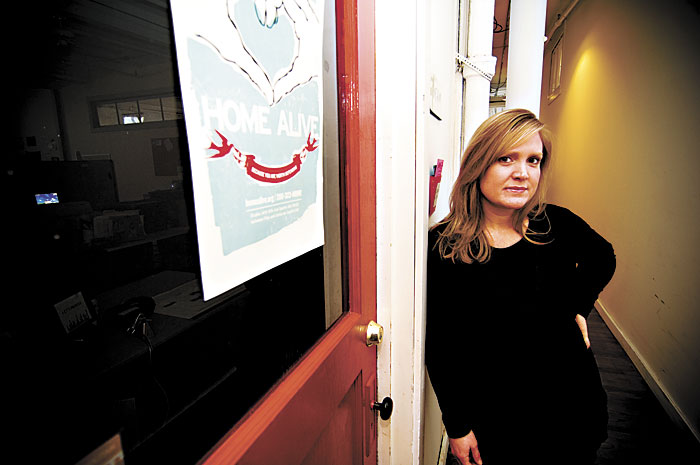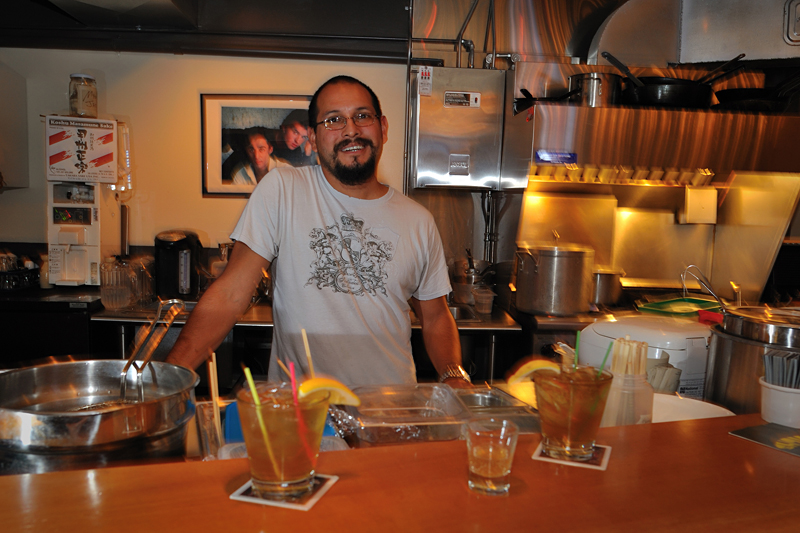Two years ago, after being attacked and raped by a stranger, Christy Forrester was unable to cope with daily life. She’d become depressed, feared leaving the house, and eventually lost her job. With no income, she couldn’t afford therapy.
That’s when a friend pointed her to Home Alive. The well-known Capitol Hill nonprofit, founded in the wake of punk rocker Mia Zapata’s 1993 rape and murder, offers classes, primarily to women, on everything from martial arts to setting boundaries with friends and family to properly using weapons. The classes charge a sliding-scale fee. If you can’t pay anything, you can take them for free.
At Home Alive, Forrester says, she regained confidence and found friends. Other women from her classes formed a kind of support group during the prosecution of Forrester’s assailant (who eventually took a plea to a lesser charge than rape). Now 35, Forrester has gone back to school for a degree in Women’s Studies at the University of Washington. “It changed everything for me,” she says.
As Home Alive enters another, and perhaps the most serious, in its long series of crises, it’s unclear how many women will have that life-changing experience available. The organization has suffered from inconsistent management since its founding. And now, with a bad economy and mounting bills, the board of directors is laying off Home Alive’s two full-time paid staffers and shuttering the studio where classes are offered to the public. No more classes are planned in the studio after this month, though classes scheduled offsite will continue through March.
The question is whether this is the end of Home Alive, or just another dip in the organization’s endless boom-and-bust cycle. Home Alive has never suffered from a lack of community goodwill, but its punk-rock ethos has kept it from becoming a reliably stable organization.
Home Alive’s roots could hardly be more indie. After Zapata’s brutal rape and murder—which went unsolved until 2003—a dozen women in the local punk/grunge scene got together in a living room and decided to raise money to host a self-defense class. But they disagreed over what should be taught, co-founder Gretta Harley recalls. Should they learn to shoot, or were martial arts more important? Finally they decided it would be best to bring in teachers to host a variety of different classes.
Harley says they didn’t intend to officially organize as a nonprofit, but after raising money through shows, a friend and attorney pointed out that if anything went wrong at a class, the women putting it together would be personally liable. So they applied for status as a nonprofit and became Home Alive.
From the beginning, Home Alive has been a popular, even fashionable cause among Seattle’s music and arts communities. In 1996, for instance, Harley helped produce a two-disc compilation album on Sony Records to raise money for the organization. Participants included Pearl Jam, the Wilson sisters, Soundgarden, and Krist Novoselic, who contributed a Nirvana track. “Every single musician on that record donated all of their proceeds,” Harley says. “It’s something I’m very proud of.” Home Alive raised enough money to move into an Eastlake office, hire four staffers, and start training its own self-defense instructors.
It was a high point, but the magic passed quickly. Two years after the album, Home Alive warned the people who helped launch it that the organization was about to shut down. “We were a bunch of anarchists at the time,” Harley says. The bylaws were written in punk-speak, she adds. No one really had any expertise in managing a sustainable nonprofit.
The rock community rallied. Home Alive raised $10,000 in a few months, and by cutting two of the staffers got back on track. In a letter recounting the financial trouble and thanking donors, posted on Pearl Jam’s Web site, Home Alive told the public it was looking into steadier sources of funding, including grants and sponsorships.
But the leadership turned over around that time as well. People joined new groups and toured or moved away from the city. “We sort of stumbled out of it,” says Harley, who now has almost no involvement with the group beyond an occasional donation. Plans for a steady income stream never were established.
In 2001, Robin Wantoch, who manages payroll for sex-toy purveyor Babeland, volunteered to be the organization’s treasurer. Again, Home Alive’s finances were in shambles. “When I came on the board, they were just about ready to go bankrupt,” she says. Wantoch convinced the board to cut the remaining staff. Two other board members dreamed up an auction. They hoped it would become an annual fundraiser, which it did—for a while.
Home Alive moved into its current location on Capitol Hill, near Neumos, in 2004. With a consistent income, the group hired a new program director, Becka Tilsen. But Wantoch had reached her limit and left. Keeping the group afloat took a huge time commitment, and most people just can’t sustain it, she says.
Nor did the annual auctions last. Home Alive’s current board president Brett Houghton, whose day job is with the Seattle Housing Authority, says that last year the board decided the auctions didn’t bring in enough money to justify themselves. Meanwhile, signs of financial trouble reappeared. In June, a post on the seattlediy.com message board promoted a benefit show scheduled at a Central District venue. “Home Alive is still needing some major support to keep their doors open,” the post said. And by last December, Tilsen was gone. Houghton says Tilsen left the group on good terms for a new job. Tilsen did not respond to messages left with Home Alive personnel and her family in Minnesota.
The board hired Cait Alexander, who’d previously served as fundraising manager for the I-1000 Death with Dignity initiative campaign, for a two-month contract to head Home Alive while the board searched for a permanent replacement. But her first paycheck was late. She soon discovered that during Tilsen’s tenure, the organization had not produced an annual report detailing its projects and finances, something many other nonprofits do.
Alexander knew money was tight, but when she asked board members when the next fundraising event was planned—wanting to know when money to pay her might come in—she discovered the organization seemed to survive by waiting for a group to decide to donate to Home Alive and send a check. Last year, for example, all the proceeds from a University of Washington production of The Vagina Monologues went to Home Alive. Since nothing of that nature had happened for some time, the money was gone.
Concerned, Alexander got in touch with the accountant who had recently started handling Home Alive’s finances. She informed Alexander that the group was $25,000 in debt: behind on rent, behind on its portion of payments for an Americorps worker, and very behind, ironically, on the accountant’s own bill. Between the debt and no set prospects for future income, Alexander says, she and the board decided it was time for serious reorganization.
So the board decided to close the Capitol Hill studio, sell its equipment, and vacate its office space. Alexander’s position will disappear. Classes scheduled offsite will continue through March. After that, Home Alive’s future is anyone’s guess.
Alexander blames the organization’s feast/famine way of doing business in part on its high turnover. “I think people come to Home Alive and then burn bright and then burn out,” she says. Revolving-door leadership creates a lack of institutional memory about past problems, she adds, with no one really thinking about ways to make Home Alive a long-term, self-sustaining operation.
A week ago Sunday, the group called a meeting to rally its troops. Fifty-six people attended, including Forrester, amid calls for yet another campaign to save the organization. In the past Forrester has had success raising money for Home Alive from friends and family in Seattle—about $2,000 last year. And she plans to keep at it. “When I saw the news that they were in this situation, it broke my heart,” she says. “I need to know that other people will have access to what I had access to.”







